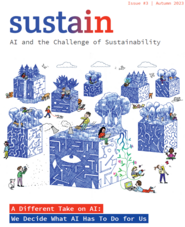SustAIn Magazine #3 – Thinking differently about AI: How we decide for ourselves which AI we want to live with
Who can take responsibility for steering problematic developments in AI back in the right direction? This is the question addressed in the third and final issue of the SustAIn magazine. Before the EU starts the final negotiations on the AI regulation on 6 December 2023, AlgorithmWatch, the Institute for Ecological Economy Research (IÖW) and the DAI Lab at TU Berlin provide an up-to-date overview of the sustainability impacts of AI – from AI resource consumption through online marketing to the water footprint of AI systems. The project was funded by the German Federal Ministry for the Environment.
This magazine invites you to consider more concrete ways in which the development and use of AI technologies could be better regulated: through more transparency in their energy and water consumption, through bans on harmful applications or through stronger incentives to make them more efficient. The authors present different approaches in case studies, surveys, policy briefs and viewpoints in this magazine.
Personalized online advertising: AI gone astray
When flyers and advertising brochures pile up in the rubbish bin, everyone realizes that this advertising waste is a burden on the environment. But what impact does personalized advertising on the internet actually have on the environment? Almost every time a website is accessed, hundreds of cookies are loaded in order to feed an invisible, yet extremely energy-intensive advertising infrastructure with personalized data about users.
Personalized online marketing through AI is making great progress, and marketing is now one of the most important fields of application for AI applications. But success in online marketing means awakening users' needs and fueling excessive consumption. The market concentration on a few large companies such as Alphabet (Google, YouTube) and Meta (Facebook, Instagram) and a resulting lack of competition hold risks as well. Moreover, AI consumes a lot of resources and energy, which has negative consequences for society and the environment.
To make the online marketing industry more sustainable, the infrastructure of the online economy and communication networks must move away from the principle of personalized advertising. “First steps could be to regulate tracking and the mass collection of data. We need to look for alternatives, such as public digital infrastructures that are no longer based on the exploitation of personal data”, say the authors Vivian Frick, Gesa Marken and Frieder Schmelzle from the IÖW.
How sustainable is my AI?
In the SustAIn project, the project team compiled comprehensive indicators that can be used to assess the social, ecological and economic sustainability of AI systems. Based on this, a self-assessment tool was developed that companies can use to test the sustainability of their AI systems and receive specific recommendations for action.
Water is the new CO₂
While artificial intelligence is playing an increasingly important role in the development of solutions to the climate crisis, its own environmental impact has not yet been sufficiently analyzed. An article in the magazine addresses the large water footprint of AI systems that rely on freshwater to generate electricity and cool servers.
~~~~~~~~~~~~~~~
Download magazine:
SustAIn – AI and its impact on sustainability (PDF, 8 MB)
About the project:
In the research project “SustAIn - Sustainability Index for Artificial Intelligence”, AlgorithmWatch, the IÖW and the DAI Lab at TU Berlin have developed proposals on how the consequences of AI systems for the climate and the environment can be measured and made transparent.




